Breadcrumb
- Portal
- Sustainability at Scripps
- Archives
Archives
-
Spring 2020 Sustainability Highlight:
Scripps composting is back!
-
PLEASE NOTE: THE SCRIPPS COMPOST PROGRAM IS CURRENTLY ON HOLD DUE TO THE UCSD CAMPUS CLOSURE FROM COVID-19. STAY TUNED FOR AN ANNOUNCEMENT WHEN THE PROGRAM RESUMES!
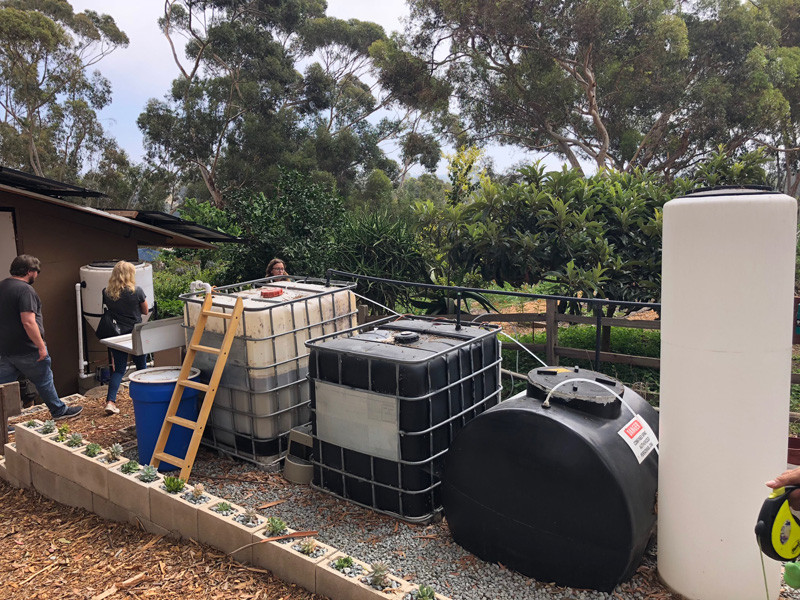
In February, the Scripps composting system came back into operation! Composting of any food waste generated around Scripps, as well as food prep at Pinpoint Cafe and Caroline's Cafe, is now collected and transported to Roger's Urban FarmLab (Revelle College, UCSD main campus). RUF has an anaerobic digester that can process large quantities of all food types and paper napkins and plate (although unfortunately NO 'compostable' plant-based dishware). The composting products are used in the RUF community gardens. We are thrilled to return to our compost system and to keep our food waste 'in-house' and local!
The Scripps composting system relies on a system of dedicated volunteers to empty 5-gallon food waste buckets from building kitchenettes and labs 1-2 times per week. UCSD's Resource Management and Planning group then transports the larger food waste collection bins up to RUF. Birch Aquarium also contributes to the compost program, particularly with their animal husbandry waste (aka 'fish guts' from feeding the aquarium animals), which is very nutrient-rich. Scripps' Nimitz Marine Facility (MarFac) also maintains a compost program! We are stoked to have such wonderful community participation in collecting our food waste. Compost collection is an essential part of UCSD's 2020 Zero Waste goal, as well as California's larger goal to reduce food waste and food insecurity.
Please contact Laura Lilly (l1lilly@ucsd.edu) if you would like to host a compost bucket in your building or kitchenette.
- December 2019: Scripps Sustainability featured at COP 25 in Madrid, Spain
-
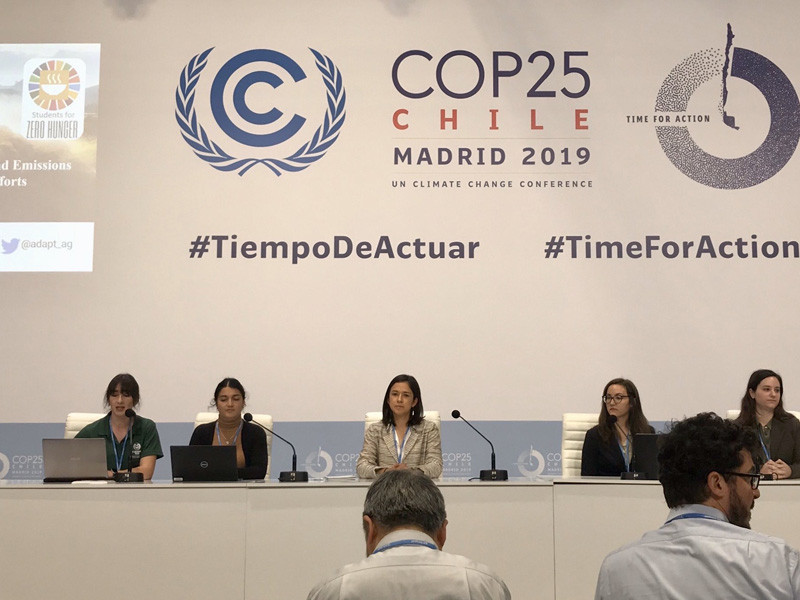
From December 2-13, 2019, Scripps students and faculty attended the 25th session of the United Nations Climate Change Conference of the Parties (COP25) in Madrid, Spain. COP is an annually-occurring session that brings together delegates from around the world to implement global and national steps to address climate change.
Scripps Sustainability was featured at COP 25 in a press conference led by Colorado State University on “Students Doing Goal-Oriented Science for the Sustainable Development Goals—SDG 2: Zero Hunger”. Julies Dohner, a Scripps Ph.D. student, presented on various Scripps Sustainability efforts and programs. She emphasized the Scripps Composting Program in the context of food waste reduction and the United Nations Sustainable Development Goal #2 of Zero Hunger. For the past two years, Scripps has partnered with UCSD’s Roger’s Urban FarmLab to utilize an anaerobic digester to process food waste generated by Scripps. This effort has been an important step in the University of California-wide Zero Waste 2020 mandate. Julia enjoyed sharing the successes and challenges of the Scripps composting program and hearing about similar student-run programs at Colorado State University and Clark University. She noted that their composting programs have generated a lot of user interest and also student eagerness to participate in sustainability programs. Julia also highlighted some of the other Scripps Sustainability waste reduction programs, including: our push for zero-waste events, food packaging reduction by caterers and vendors, our water bottle refill stations to reduce plastic bottle use, and the Pinpoint Café mug-share program.
Julia reiterated a message she heard at a talk on "Singapore Youth for Climate Action: Transforming Climate Science to Climate Action," which emphasized that universities are perfect "mini-cities" for testing and pushing forward green technologies. She noted that “It made me realize how universities, which, at a smaller and more manageable-scale than cities and with more autonomy in decision-making, can truly be trailblazers and models for larger systems in terms of their sustainability goals and solutions.” Thank you, Julia, for helping to share the work and goals of Scripps Sustainability!
- Farewell to Allyson Long, Scripps Sustainability Coordinator, 2016-2019!
-
In January 2020, we said farewell to Allyson Long, our wonderful Scripps Safety and Sustainability Coordinator for the past three years, Allyson is headed to Seattle to work with SpaceX, where she will be a part of their Environmental Health and Safety team.
Allyson has been instrumental in implementing numerous sustainability practices around Scripps over the past several years. She organized a 'soft plastics and other special recyclable items' pickup program and the Scripps composting system, and worked closely with Roger's Urban FarmLab on compost quality and acceptable items. She was an important liaison to Caroline's and PinPoint Cafes for encouraging food prep composting, switching to plant-based dishware, and implementing a coffee mug-sharing program at PinPoint. Allyson also developed and managed the reusable dishware checkout program, under which anyone at Scripps can borrow a set of reusable dishware for events to avoid single-use plastics. Additionally, Allyson organized and ran the Biannual Scripps Garage Swaps in April and October, numerous other Earth Week events, and the Scripps group for the International Coastal Cleanup Day every September. Allyson even advocated for the development of this sustainability webpage!
Most of all, Allyson was a constant and energetic resource for sustainability, and shared much knowledge with Scripps about current and upcoming policy changes and local resources. We thank Allyson for developing important contacts with the broader UCSD community to promote campus-wide sustainability, and for helping Scripps implement steps toward waste reduction and a cleaner earth and ocean.
Scripps is in the process of hiring a new Safety and Sustainability Coordinator. In the meantime, we are carrying forward many of the programs Allyson helped start!
-
October 2019: Composting/Recycling Workshop and Bi-Annual Garage Swap:
"Compostables, Biodegradables, and Recyclables at UCSD"
-
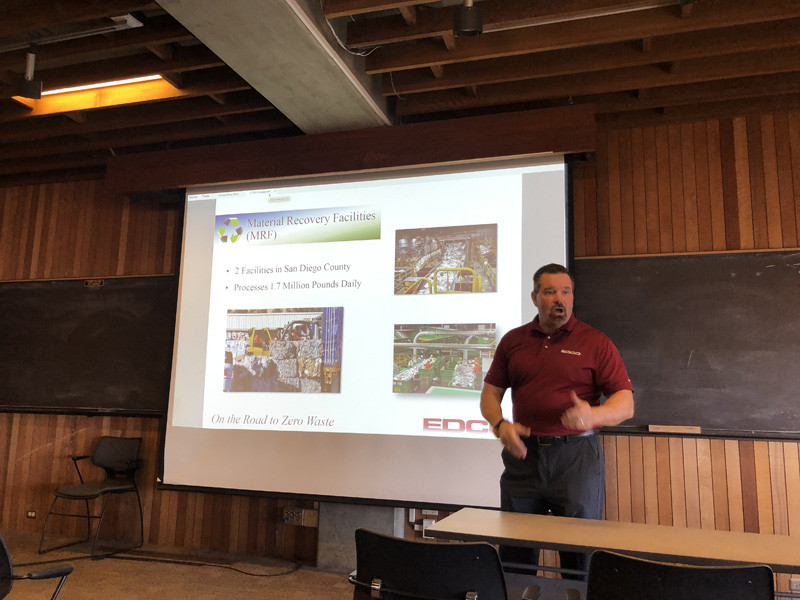
On Thursday, Oct. 24, SIO for Sustainability hosted a workshop on “Compostables, Biodegradables, and Recyclables at UCSD”. The workshop featured a panel of waste managers from UCSD and the City of San Diego who provided information about the current state of waste management, recycling practices, and food waste diversion in San Diego, and how current and upcoming changes would impact UCSD. The panel included speakers from:
CalRecycle (California’s Department of Resources Recycling and Recovery) representatives – brings together California’s waste management and recycling programs and works to inspire state inhabitants to” achieve the highest waste reduction, recycling and reuse metrics in the nation.” EDCO representatives – a family-owned waste and recycling hauler that services areas around Southern California. EDCO is UCSD’s official waste hauler. Jeffrey Summerhays, UCSD Waste Diversion Manager Roger’s Garden/Urban FarmLab – one of UCSD’s campus gardens and the utilizer of Scripps compost collectionEDCO showed a video of their new Escondido recycling center, which has novel methods for sorting and processing almost all types of recyclable materials. One goal of the EDCO facility is to increase local Southern California recycling to accommodate comingled, mixed-stream recycling. 65% of California’s recycled materials used to go to China, which now requires contamination levels of <0.5%.
The presentation centered around meeting two upcoming deadlines: the University of California’s Zero Waste by 2020 mandate, which requires all UC campuses to achieve 90% diversion from landfills by 2020; and California’s collection of statewide mandates to significantly reduce landfill waste and greenhouse gas emissions by 2025. California generates 27 million tons of organic waste every year, including 6 million tons of food waste. One of CalRecycle’s goals is to divert that food waste back into food programs for those who are food-insecure (1 in 6 Californians). Some of the key state bills discussed included:
AB 341 – a statewide mandatory commercial (including the UC system) recycling system which requires 75% diversion of solid waste statewide by 2020 AB 1826 – expanded on AB 341 to include mandatory organic waste recycling by the commercial sector. 35% of California’s waste stream is comprised of organic waste (food scraps, landscape trimmings) which can instead be turned into compost and mulch. The goal is to have 75% diversion of organics statewide by 2020. AB 827 – Businesses (including the UC system) will be required to have front-of-house ‘food management systems’ (i.e., recycling and composting bins) available to customers by July 1, 2020.- Sarah Boltwala-Mesina, CEO of Inika Small Earth Food2Soil – a program focused on small-scale, decentralized composting collection that can connect urban residents to composting programs that fuel local farming efforts.
- September 2019: Coastal Cleanup Day
-
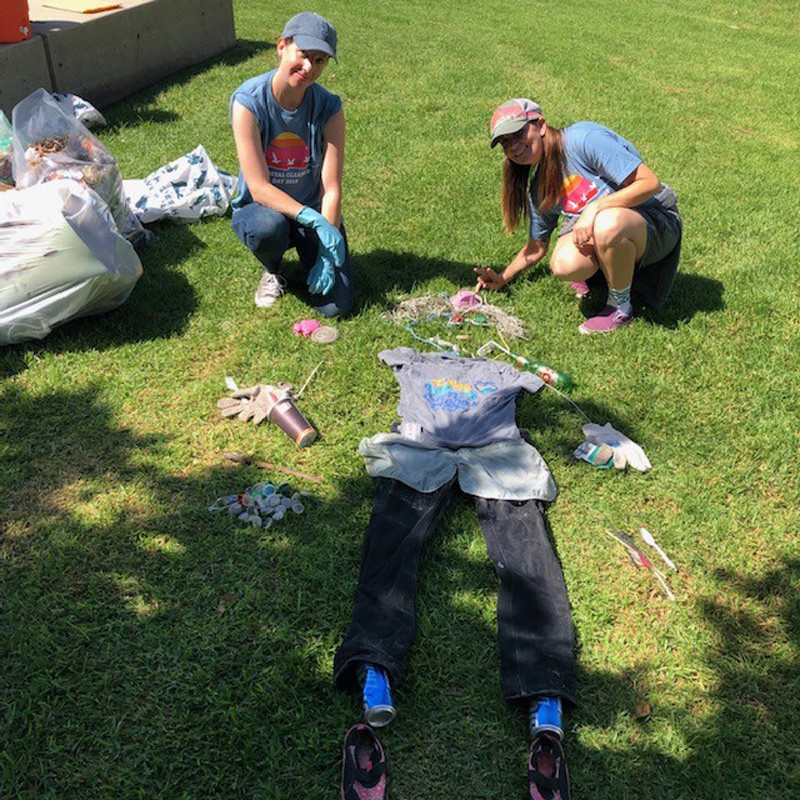
Sarah Morgan Sickler (Birch Aquarium) and Allyson Long (Scripps Oceanography) pose with the trash 'mascot' they compiled from beach cleanup trash
On Saturday, Sep. 21, sustainability leaders from Scripps led 100 volunteers in a cleanup sweep of the beach around the Scripps Pier and Scripps campus. The group collected a total of 79.5 pounds of trash and 11.5 pounds of recycling! Some of the most common items were plastic utensils and plastic fibers. Identifying the most common types of trash in addition to the total amount collected can help us determine where that plastic is coming from and how we can more specifically target our land-based practices to reduce waste at the source BEFORE it ends up in our beaches and oceans!
- August 2019 Highlight: Imperfect Produce at Birch Aquarium/Scripps
-
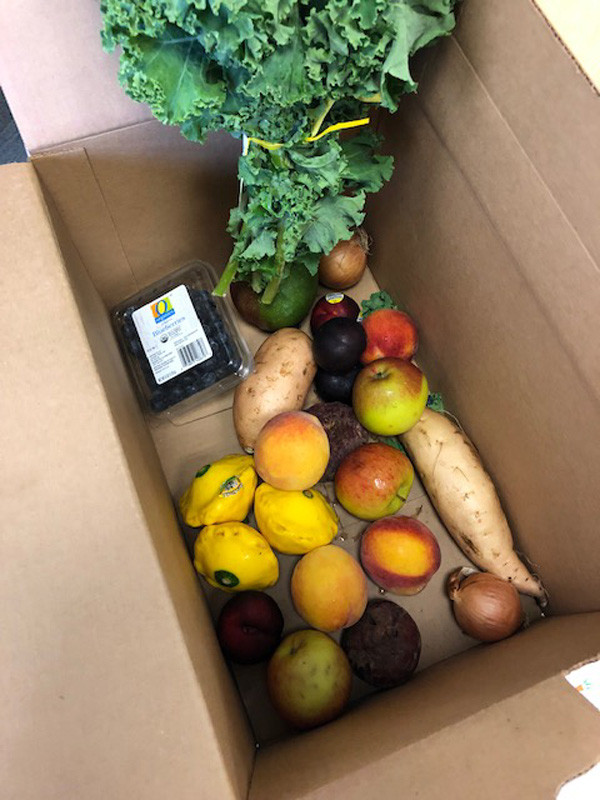
Scripps Institution of Oceanography and Birch Aquarium are thrilled to announce that we now have a group membership with Imperfect Produce to bring discounted local produce to faculty and students! Imperfect Produce began in San Francisco and currently services the Bay Area, Los Angeles, Portland, and San Diego. According to Imperfect Produce, 20 billion pounds of food waste produced on farms go to waste every year simply because it isn’t aesthetically pleasing enough for stores to sell. As its name implies, Imperfect Produce takes fruits, vegetables, and nuts that are perfectly nutritious and flavorful but too blemished, small, lopsided, or ripe for grocery store standards and delivers them directly to consumers. This system provides the added benefit of offering produce at cheaper prices than are available in stores, because it more directly connects farmers and consumers.
Imperfect Produce gives customers the option to customize the size of produce box they receive and to request only the types of fruits and vegetables they are interested in. Seasonal cycles and harvest times affect which produce ais available in any given month, but unlike a typical produce box that may give you foods you don’t want or know how to cook, Imperfect Produce wants to match you up with only the foods you actually want to eat. Birch Aquarium is now a registered dropoff point for Imperfect Produce boxes, which means that Scripps affiliates can register for the program and have their boxes delivered free to Birch for pickup. Check out the Imperfect Produce website for pricing and registration details, and sign up today to start your box delivery!
- April 2019: Earth Week highlights!
-
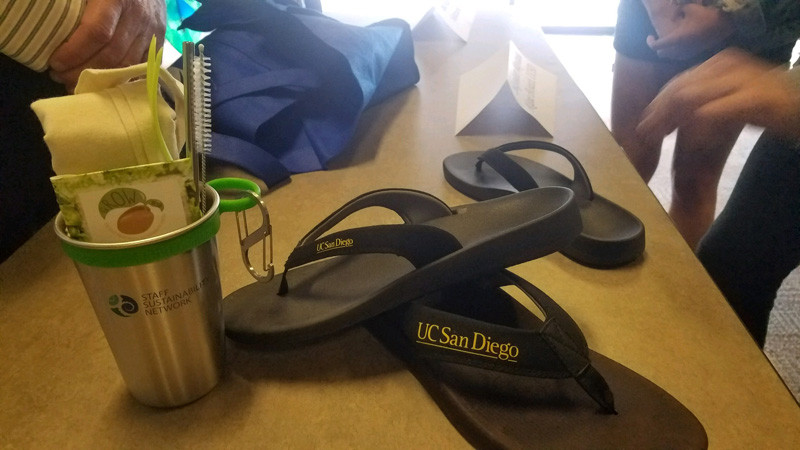
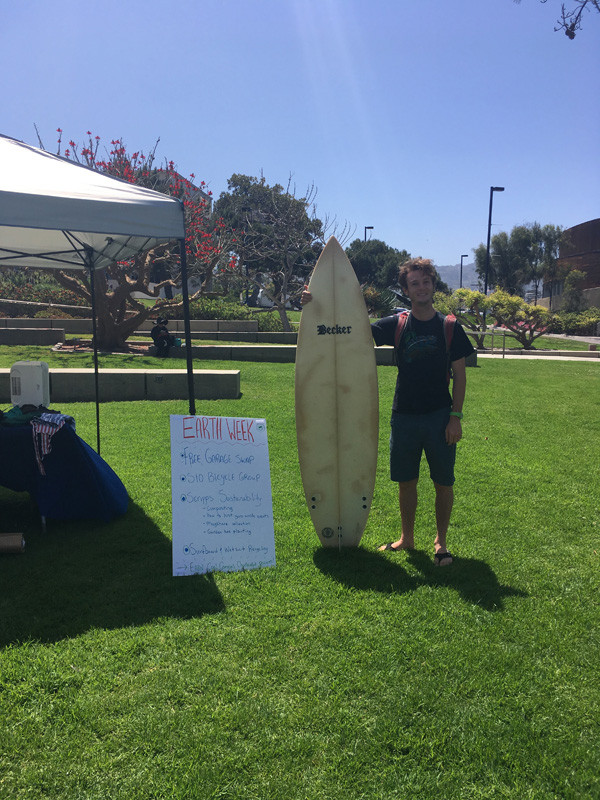
Tuesday, April 23
Our beach cleanup collected almost two full 5-gallon buckets of plastic, styrofoam, cigarette butts, string, and other non-biodegradable trash. As usual, most of the pieces we collected were small broken-down bits, either from the beach or (more likely) washed up from the ocean by the tide. Picking up trash, while rewarding, is a sobering reminder that we need to tackle our pollution at the source by buying and using fewer plastic-encased items. Thank you to our volunteers!
We also hosted a CMBC Brown Bag panel titled 'The Science of Sustainable Surfing: What's in your board, what happens when you're done with it, and how surfboards can be platforms for oceanographic data collection." We had four terrific panelists who engaged in a lively discussion on alternative surfboard materials (including algae, which is now also used in flip-flop production), how to reach more of the surfing industry with eco-friendly boards, options for upcycling surfboards, wetsuits, and materials when boards break, and how The Smartfin Project is using surfboards as a platform to get oceanographic sensors out into the surf zone every time a person goes out to surf. Thank you so much to our panelists! Stay tuned for a video of the talk.
"The Science of Sustainable Surfing" panelists:
- Dr. Phil Bresnahan, The Smartfin Project/Scripps Inst. of Oceanography - using surfers and surfboards as platforms for citizen science-based oceanographic data collection
- Professor Stephen Mayfield, UCSD - Turning algae into everything from surfboards to flip-flops
- Kevin Whilden, Sustainable Surf - ECOBOARD certification, Foam to Waves, and other Deep Blue projects
- Billy Burns, Rerip San Diego - upcycling used and broken boards into art and building materialsWednesday, April 24
UCSD put on a Carbon Offset Workshop at Scripps, where they discussed the University's Climate Action Plan and grants to support ongoing projects that may help the University with carbon offsets.
SIO for Sustainability hosted our biannual Garage Swap on Pawka Green, where people can donate old clothes, books, and household items and pick up items that other people have donated. This year we also collected old surfboards and wetsuits! We received one surfboard and 7 wetsuit donations, all of which were given to Coconut Peet's and Rerip, a local San Diego company that upcycles board and wetsuit materials.
- April 2019: Scripps Institution of Oceanography Earth Week 2019
-
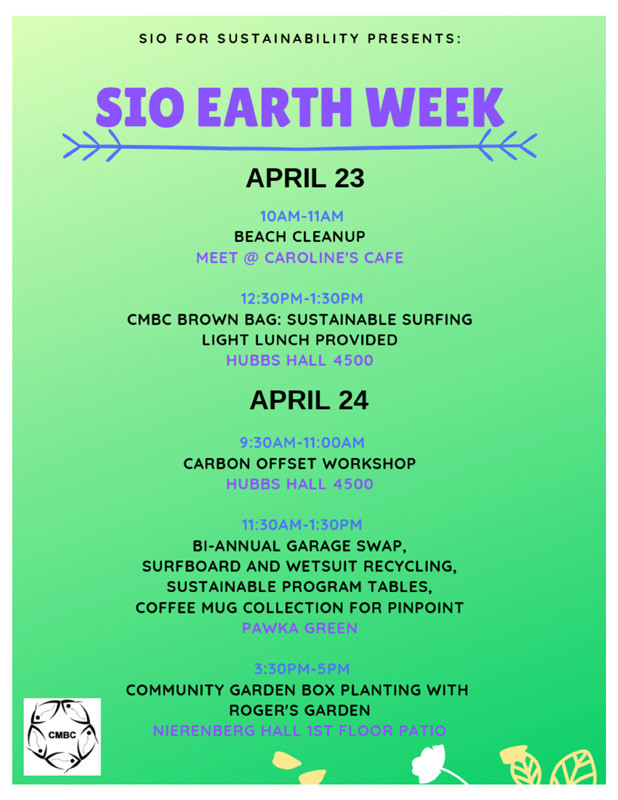
CMBC Brown Bag Seminar, April 23, 12:30-1:30 pm
"The Science of Sustainable Surfing: What's in your surfboard, what happens when you're done with it, and how surfboards can be used as scientific platforms"We are very excited to announce our panel of speakers:
- Dr. Phil Bresnahan, The Smartfin Project/Scripps Inst. of Oceanography - using surfers and surfboards as platforms for citizen science-based oceanographic data collection
- Dr. Stephen Mayfield, UCSD - Turning algae into everything from surfboards to flip-flops
- Kevin Whilden, Sustainable Surf - ECOBOARD certification, Foam to Waves, and other Deep Blue projects
- Billy Burns, Rerip San Diego - upcycling used and broken boards into art and building materialsBiannual Scripps Garage Swap and Sustainability Information tables, Pawka Green, April 24, 11:30 am-1:30 pm
- Bring in or pick up gently used clothing, household items, and books. This year, we will also be accepting used wetsuits and surfboards to donate to several board upcycling programs around San Diego.
- We will also have information tables for current sustainability programs around Scripps, Birch Aquarium, and UCSD. Come learn more about our composting program, reusable dishware set for events, sustainable events guide, and PinPoint Café mugshare program. The SIO Bike Group will also be offering free bike help in preparation for Bike to Work Month in May! - February 2019: Scripps Bin Buddy program
-
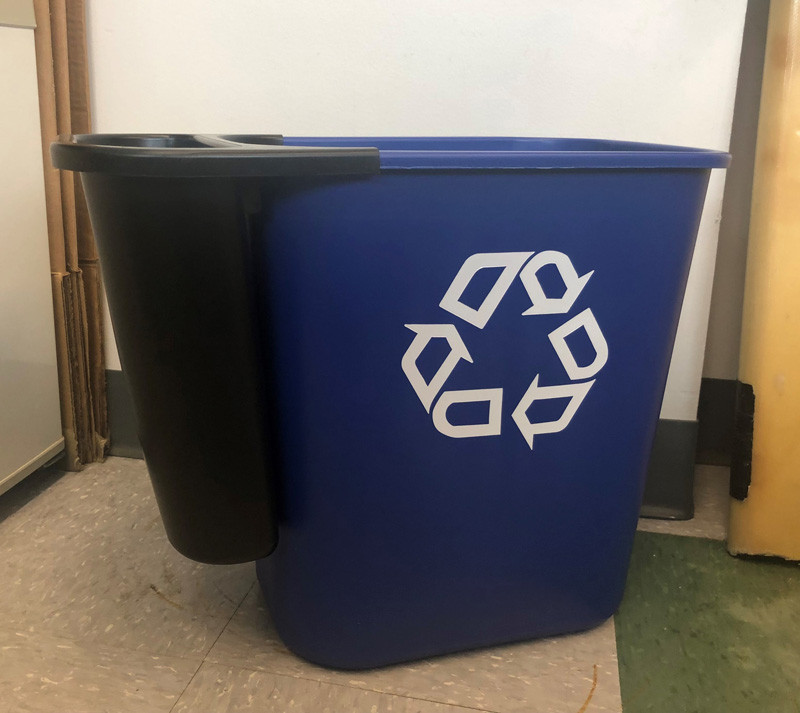
As part of UC San Diego’s goal of ‘Zero Waste by 2020’, the entire UCSD campus is implementing a ‘Bin Buddy’ system in individual offices to cut down on trash thrown away on campus. The Bin Buddy system consists of a normal-sized blue recycling bin with a much smaller trash bin attached to the side. The goal of the system is to encourage people to recycle, compost, or pack out (take home) as much of their waste as possible, and to put as little as possible into the UCSD landfill system. Campus custodians will only empty the bins once per week, so if people fill their office bins more quickly they must empty them into communal building trash cans. In addition to smaller trash cans, UCSD is encouraging waste reduction by not lining either bin with a plastic bag. For a list of recyclable items, see the UCSD recycling webpage: http://sustain.ucsd.edu/involve/recycle.html
All UC campuses are implementing the Bin Buddy program, and they join many other colleges across the nation in implementing the program. Visit the UCSD Bin Buddy webpage for more information: https://blink.ucsd.edu/facilities/management/cleaning/bin-buddy.html. Scripps is the first department at UCSD to receive the Bin Buddy program, but the campus aims to have all offices at UCSD converted by mid-2019.
- December 2018: Caroline's Seaside Cafe
-
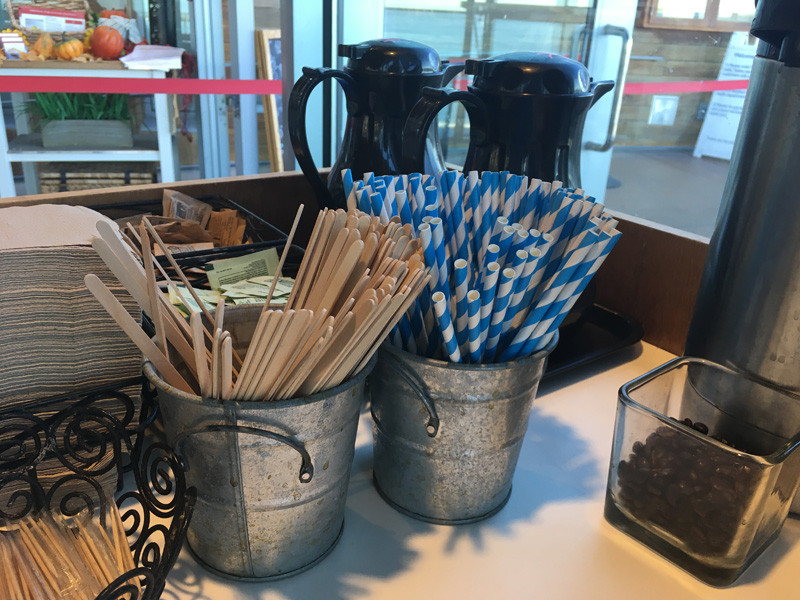
Caroline's Cafe has implemented numerous steps to make it a sustainable and ocean-friendly restaurant in line with overall Scripps ocean health goals. Caroline's has been composting all pre-consumer food waste since March 2018, diverting an average of 10-15 gallons of waste per day. Caroline's also recently switched to only offering paper straws (and only upon consumer request) and no longer providing disposable cups for any in-house beverages. On the takeout front, Caroline's only gives disposable utensils upon request and uses non-expandable polystyrene takeout containers. Caroline's also sources foods locally and from sustainable sources, and provides numerous vegetarian options. To help support Caroline's mission of waste reduction, please bring your own coffee mugs for a discount on coffee!
-
October 2018:
Pinpoint Café at the Eckart Building
-
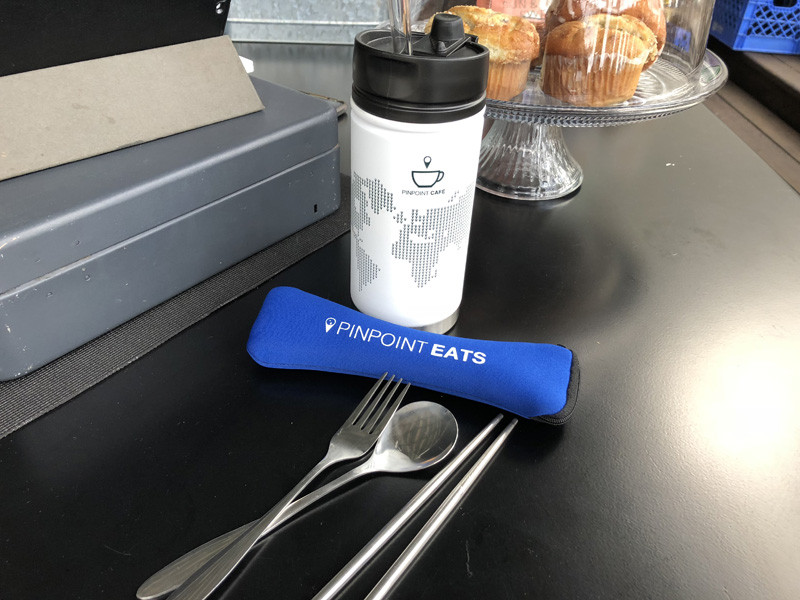
In July, Pinpoint Café moved in as the new coffee vendor outside of Scripps’ Eckart Building, and Pinpoint has been working since then to promote sustainability in all aspects of its Scripps location. Pinpoint voluntarily participates in the Scripps composting program by composting all of its coffee grounds and offering a compost bin for the Scripps community to dump their food scraps. All lunch foods sold at Pinpoint are prepared by hand in their local Del Mar kitchen using fresh ingredients. Pinpoint also focuses on reducing extra packaging on breakfast pastries and other ordered foods. Pinpoint also sells reusable to-go coffee mugs, glass straws, and cases for carrying reusable utensils.
Scripps is working to install a dishwasher so that Pinpoint can offer the option of reusable cups for people making ‘sit and drink’ orders at Pinpoint. In the meantime, Pinpoint uses compostable coffee cups and plant-based compostable straws, both of which will soon be accepted as actual compost by UCSD’s Roger’s Garden!
-
September 2018:
2018-19 MAS Program – Summer events with reusable dishware
-
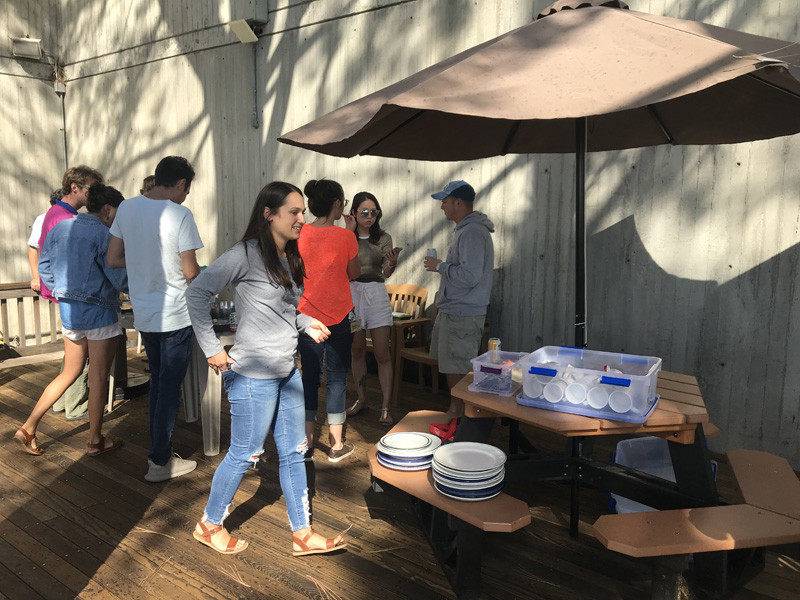
The new class of MAS students who started at Scripps this July are being fully indoctrinated into all aspects of marine biodiversity and conservation. In addition to extensive coursework and projects which they will develop and carry out over the course of this year, the MAS program is practicing sustainability by using the Scripps reusable dishware set at their summer events. The reusable dish set, which is maintained by Allyson Long (Scripps Safety Coordinator), provides a way to host ~20-person events without generating single-use waste.
The MAS program has so far hosted two events with the reusable dish set. In August, the MAS Marine Biodiversity and Conservation (MBC) group had an evening mixer with the Ocean Biosciences Ph.D. students to meet, share research ideas, and talk grad life. Having familiar faces and grad student mentorship will help the MAS students take full advantage of Scripps resources during their fast-paced one-year program. In early September, the MAS Climate Science and Policy (CSP) program had a reception at Scripps following their weeklong trip to Sacramento for the Climate Adaptation Forum. During the forum, the cohort learned about current challenges and emerging trends in climate resilience work and discussed how to support the State's transition from adaptation awareness and planning to action, so they didn’t want to come home and use a bunch of disposable dishes while they celebrated. As MAS Program Coordinator Risa Farrell noted: “What better way to discuss all this food for thought on policy than by using reusable dishes!”
The MAS MBC and CSP programs emphasize conservation, and many of the students choose capstone projects focused on marine conservation and climate change. Social events are an important part of the cohort’s bonding, idea-sharing, and networking, and having events that emphasize reusable practices such as non-disposable dishware helps the program stay true to its conservation principles. In addition to utilizing reusable dishware, the MAS program provided all incoming students with a reusable water bottle and utensil set, with the expectation that students would bring these items to all events. The MAS program plans to continue using the Scripps reusable dishware set at events throughout the year, and Scripps Sustainability’s goal is to expand the set to be available for larger events.
Thank you to MAS program coordinator Risa Farrell, who has been very proactive about checking out the reusable dish set and providing feedback from events! The set is available for checkout to anyone at Scripps free of charge (you must wash the dishes before returning).
-
August 2018: Dr. Phil Bresnahan
Smartfin Project and Bike to Work Month
-
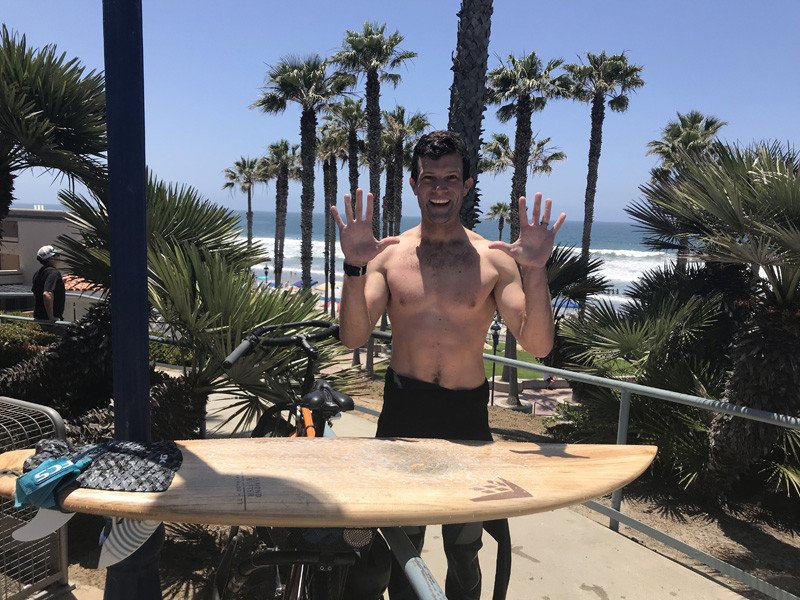
Phil Bresnahan is an alumnus of the Scripps Institution of Oceanography PhD program in Applied Ocean Sciences. For his PhD thesis, in Todd Martz's lab, Phil developed and applied autonomous in situ inorganic carbon sensors to measure ocean acidification at high spatiotemporal resolutions. Phil now works on the Smartfin Project, which designs surfboard and standup paddleboard fins with GPS-equipped physical and chemical sensors that measure oceanographic parameters (temperature, wave characteristics, pH) of the nearshore surfzone while people surf.
In June 2018, Phil undertook what he called Bike to Surf Month (modeled after the popular Bike to Work Month). Every day for the entire month, Phil picked a different surf spot along San Diego’s coastline and transported himself there and back solely by bike (stopping to surf, of course!). Phil explains his idea for the monthlong self-challenge by noting that he had spent over 95% of his surf sessions at one spot in San Diego: Scripps. While walking out of the office straight to the beach for a lunchtime surf is pure joy, Phil felt that his progress was limited by only surfing one place. He wanted to check out other breaks in San Diego, but the thought of driving his car – pumping out more CO2 on his way to enjoy a natural setting and measure CO2-induced changes in the ocean while surfing – just seemed wrong. So Phil challenged himself to bike to each spot instead.
Phil surfed 31 times in 30 days and covered 869 miles by bike and surfboard. He went as far south as Imperial Beach and as far north as Oceanside Pier. He (only) had four or five flat tires, and he used a Smartfin every time he surfed. He saw old friends in Del Mar and Encinitas and met new people on the waves and the road. Some of the strangest questions he got where: Was he on an electric bike? (a big compliment, since it meant he was keeping up with non-surfboard-bikers); Had he figured out how to use his surfboard as a sail for his bike? (Not yet, but also a compliment); And why was he wearing a fanny pack out on the water? (it’s hard to lock up your wallet on your bike while you’re surfing!). You can visit Phil’s blog for daily details of his excursion and the bike gear he used.
One of Phil’s important realizations (or perhaps remembrances) was that we can have plenty of adventures in our own backyards. Phil calls this pursuit ‘micro-adventures’, where, instead of hopping on a plane to a distant country or buying a bunch of gear to go “have an adventure”, you can find excitement at home using a little creativity to try something new or pursue familiar activities from new angles. Phil’s best advice for creating micro-adventures? Just start! Pick something you’ve been thinking about and try that. Who knows where it will lead you? That’s the adventure.
- Scripps Bike Group
-
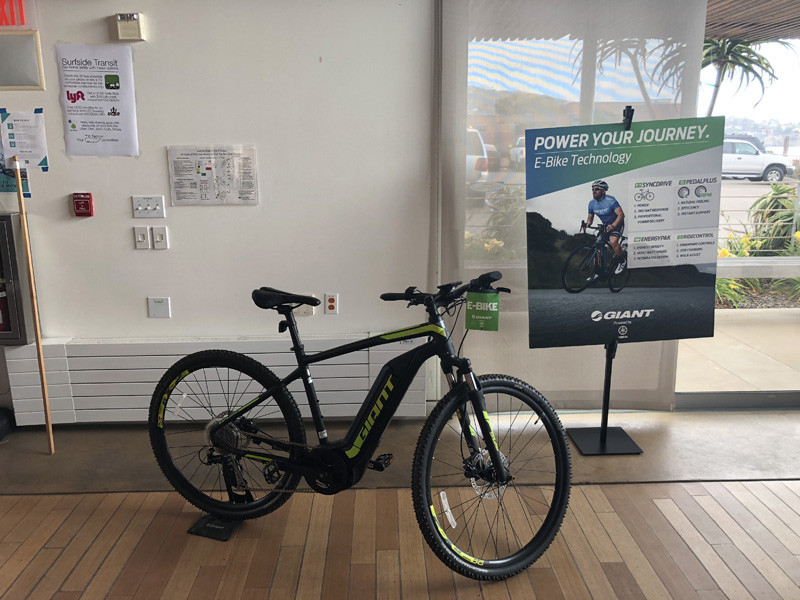
The Bike Commute Support Group encourages and facilitates biking as the most fun, healthy, economical, and sustainable way to get to Scripps. The group provides a forum for bikers to meet, ask for help, and organize events. The group holds Bike to Work Month annually in May, where Scripps members can create teams and compete to bike the most miles throughout the month.
Contacts and Resources
Join the bike@sio.ucsd.edu mailing list
SIO Bike Commuting Guide: summarizes reasons to bike and advice on overcoming barriers to bike commuting (e.g., how to buy a bike, best routes to Scripps, showers at work)
Contact the Bike Group with any other ideas! Potential future activities include: advocacy for local bike infrastructure/safety, fun community rides, Bike Trains
-
SIO Bike Ambassador List: friendly people available to answer your biking questions
-
SIO Strava page: maps of suggested bike routes to Scripps from nearby
-
Bike to Work Month 2018 competition (see details and flyer)
-
Free bike maintenance classes and check-ups with local mechanics
-
-
July 2018:
Lori Mendez, MAS MBC 2018
-
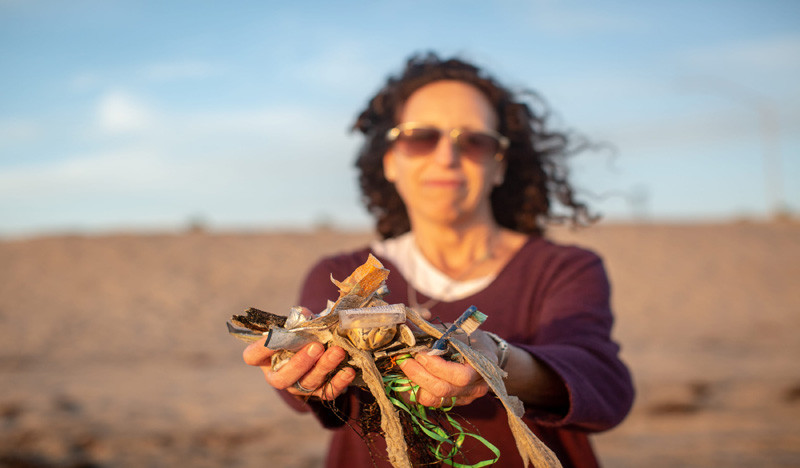
Having grown up next to the ocean in Coronado in the 1970s and 80s, and interested in learning how to effectively help solve the massive ocean plastic pollution problem, in July 2017 Lori took a one-year sabbatical from her local law practice to attend the Scripps MAS MBC program.
Before coming to Scripps, Lori helped out with many beach clean-ups over the years, but learned that clean-ups alone are not enough. We must go further upstream to the source, working to change consumer behavior and also holding producers and vendors responsible for the social and environmental damage caused by single-use plastics.
For Lori’s MAS capstone project, she joined forces with zero-waste and sustainability-conscious students, faculty, and administration to "connect the disconnect" between the ocean research and conservation happening at Scripps and the single-use plastic products (particularly food containers) still being sold around Scripps and UC San Diego.
Lori is grateful to the sustainability advocates at Scripps and UC San Diego who have tirelessly worked for the transformational changes that are taking place right now on the campus to allow us to “walk the talk” and lead the world in reducing single-use plastics. Check out the bottom of this page for Lori's video ("Walk the Talk") about reasons we need to implement those changes now. You can contact Lori at: lrmendez@ucsd.edu or lori@mendezplc.com.
- Scripps Coral Garden at Eckart Building
-
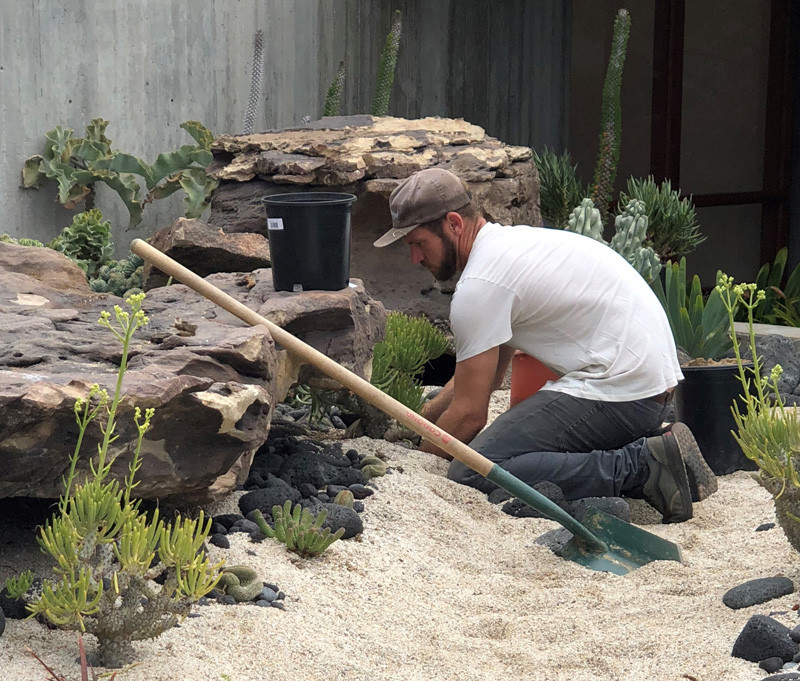
MAS MBC Class of 2017 alum Brant Chlebowski works on the Scripps Coral Garden
Nina Rosen and Brant Chlebowski, alumni of the Scripps MAS Marine Biodiversity and Conservation Class of 2017, developed the idea to build a drought-tolerant succulent garden evoking underwater coral reefs outside of Scripps's Eckart Library building.
The garden is part of the Scripps Coastal Meander, which makes up a portion of the California Coastal Trail. The pair has worked with numerous collaborators from Scripps, including the Facilities and Management Division and the Jennifer Smith and Stuart Sandin Labs at Scripps, to construct the garden to accurately convey an underwater coral environment.
Specific succulents were chosen for their similarity to coral species, and the garden is separated into zones that mimic an actual reef crest, fore reef, and lagoon.
- Eckart Fish Bowl
- Eckart Sea Cave
- Hubbs Hall 4135
- Hubbs Hall 4500
- MESOM 151
- MESOM 251
- MESOM 351
- Nierenberg Hall 101
- Nierenberg Hall 327
- Nierenberg Hall 400
- Nierenberg Hall 432
- Old Scripps Building 20
- Spiess Hall 330
- Sverdrup Hall 1267
- Vaughan Hall 100
- Vaughan Hall 300
- Vaughan Hall 328
- Vaughan Hall 348